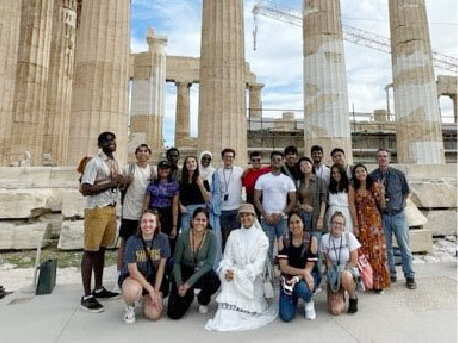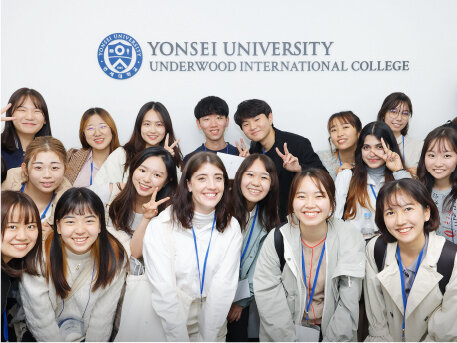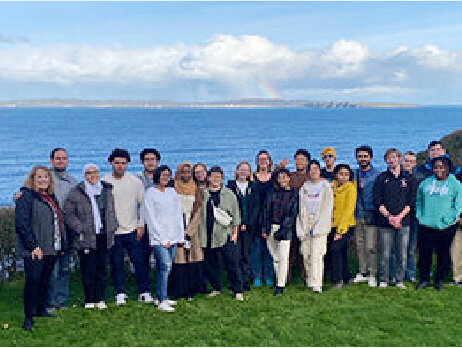Tackling global challenges with
ICU's internationalism and
global relevance
Global issues today have no easy solutions.
Addressing them requires the capacity and humanity to survive a complex world and an uncertain future.
Embracing its founding missions of internationalism and an aspiration for peace, ICU has been coping with rapid globalization waves and making constant reforms. Having experienced the pandemic, we are now trying to enrich our liberal arts education of global relevance and to make it more open to the world and society.
Addressing issues from multidimensional perspectives and through critical thinking, embracing what is different, never giving up on dialogue...
Such global citizens with a global perspective gather and learn from one another in a miniature global community called ICU.

GLOBAL ACTIONS
Actions Leading ICU to the World
12 Signs of ICU's International Focus
1International Faculty
World-class ICU Education
All faculty members at ICU are hired through open international recruitment. They come from around the world regardless of their nationalities, making world-class education possible at ICU. The percentage of international faculty members (mostly non-Japanese members and Japanese members who have earned a degree abroad)* is 88.7%. This puts ICU on par with world-class universities in terms of the quality of education.
※The Ministry of Education, Culture, Sports, Science and Technology's Top Global University Project: Project Proposal

2International Students
Values differ among the Japanese; they do so much more between Japanese and international students. International students at ICU have been educated in many different countries and regions--totaling some 50--regardless of their nationality. Students with diverse educational backgrounds learn together on the ICU campus. Brimming with true diversity, the campus opens up hearts and develops what it takes to gain trust in the international community, i.e., to become global citizens.

3Classes Taught in Foreign Languages
Bilingualism in Japanese and English is part of our education ethos. We teach in Japanese for classes that should be taught in Japanese, such as teacher certification courses, and in English for classes that can be taught in English. This arrangement helps enhance the quality of education at ICU, which provides specialized education in both languages.
What makes ICU special: No "English only" track to graduation. Just as Japanese students expose themselves to a different world on campuses abroad, students from abroad can encounter the real Japan on a Japanese campus. This is why ICU does not offer English-only programs that allow students to graduate without taking classes taught in Japanese. ICU is committed to bilingual education in Japanese and English.

4Studying Abroad while at ICU
Dialogue with people who live with diverse backgrounds is necessary if students want to become responsible global citizens. ICU's study abroad programs are designed for students to learn with local students and take credits at universities abroad. These programs are characterized by diverse options depending on the objective and duration of studying abroad. They also testify to the international comparability of an ICU education.
What makes ICU special: ICU does not aim to increase the percentage of students with experience in studying abroad to 100%.
ICU has returning students, international students with the aim of studying in Japan, and many other students who have found something they devote themselves to here in this country. Requiring these students to go abroad to study may undermine their motivation or agency. Offering options for studying abroad to meet student needs is part of our mission; however, it is up to students to decide whether they participate in our study abroad programs. We encourage students to ask themselves which option is best for them.

5Writing Senior Thesis in English
All ICU students are required to write a senior thesis before graduation. They spend about one year putting together a senior thesis on a theme of their choice to cap off their undergraduate studies. They are required to synthesize what they have learned, exercise critical thinking to make their case and produce their academic output in the form of a thesis. These requirements offer an opportunity for students whose first language is not English to put to the test their academic writing skills in English in a style that fits their field of specialty. In fact, over 35% of senior theses at ICU are written in English.
What makes ICU special: A senior thesis written in English must contain a Japanese summary, while a senior thesis written in Japanese must contain an English summary. Students challenge themselves to master bilingualism until the very end--their graduation.

6Enhancing Students' Ability to Learn through Language Education
ICU's language education is designed for students not only to learn languages but also to develop their thinking ability and academic skills needed for undergraduate studies.
The English for Liberal Arts Program (ELA), an introductory course, underpins liberal arts studies, which cut across the humanities and sciences. ELA offers multiple science topics and has a section on natural science papers and another on social science papers. It also offers Advanced English Studies designed for students to prepare for TOEFL and IELTS and improve their presentation skills. Moreover, the program offers Research Writing, a substantial course for students who have English language skills but not enough to write a research paper. The Japanese Language Programs (JLPs), on the other hand, offer an introductory course in April and September to coincide with the start of our two admission seasons. The JLPs include the Special Japanese Program for returning students admitted in April who want to further enhance their Japanese language skills. The JLPs are designed to meet diverse needs; they offer different levels of courses, including those skill-based,
tailored to meet the needs of intermediate and advanced learners.

7Credits Earned from Courses Taught in English
Since our foundation, we have pursued bilingual education in Japanese and English. We encourage students to take a balance of courses offered in Japanese and English in the number of credits they earn before graduation. In fact, students earn many credits for courses taught in English. People needed in future society are those who have open values and the agency to continue life-long learning; work with others as responsible global citizens at international and community levels, in countries around the world including Japan, in different fields and types of work, and in their personal lives; and thus contribute to the peace and coexistence of humankind. ICU is committed to putting its principles into action to continue nurturing such individuals.
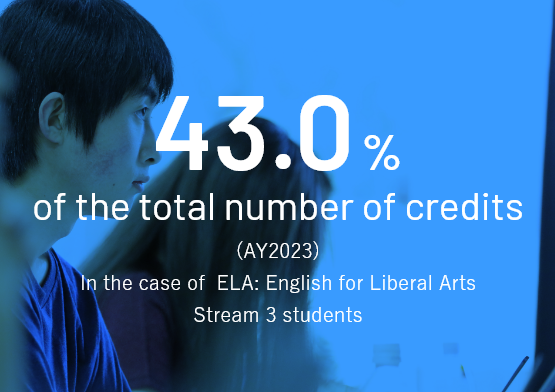
8Provision of Syllabi in English
ICU offers the syllabi of many courses, even those taught in Japanese. These syllabi help international students, returning students, and others with limited proficiency in Japanese to facilitate their course planning.
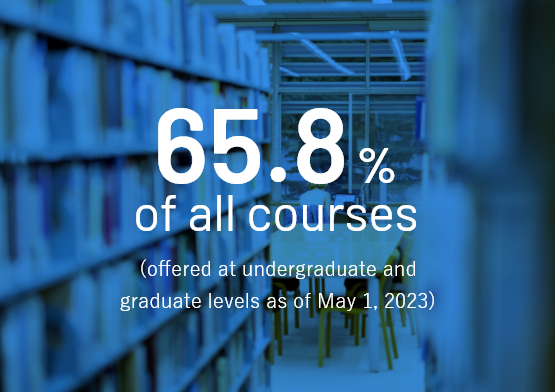
9GPA and Course Numbering Systems
The grade point average (GPA) is a numerical representation of a student's academic performance. In addition to enabling faculty members to offer personalized advice regarding course selection, GPA is used worldwide as an indicator when screening for scholarship awards and eligibility for study abroad programs. Course numbering assigns numbers to courses according to their content level. It is a standardized tool for understanding the levels of courses by number across different education systems around the world. ICU has been using these systems since its foundation. The systems allow ICU students planning to study abroad to understand how courses offered by ICU are aligned with those offered at their destination universities. It thus facilitates course planning. The course numbering system also facilitates the transfer of credits earned there. Conversely, the system enables international students considering studying at ICU to check whether ICU offers specialized courses of their interest, as well as the contents and levels of the courses it offers, before coming to Japan. It thus helps such international students with course planning.

10Student Dormitories
In April 2017, ICU opened two student dormitories: Momi House and Maple House, bringing the total number of dormitories on the ICU campus to ten. Now, three out of every ten ICU students live together and learn from one another on campus. ICU dormitories are characterized by the fact that students manage them on their own accord and value dialogue in the process. Students in each dormitory hold a dormitory meeting monthly as a matter of principle. At a dormitory meeting, students decide on how to share roles associated with living together, what is called "duties" or chores, such as cleaning. They also discuss in-dorm events and dormitory management issues. These processes help them shape autonomous and collaborative communities. University authorities do not set dormitory rules unilaterally. These rules are decided on through consultation between university authorities and dormitory students based on substantial discussions on the part of the latter. This characteristic is unique to ICU, which places special emphasis on dialogue.

11Ratio of Female Faculty and Staff
Diversity is said to provide a breeding ground for new ideas that can change the times. Faculty members with diverse backgrounds make quality education possible.

12Administrative Staff who Support Globalization
Each office of ICU has staff members who have experience in studying abroad or have otherwise a good command of English. These staff members provide all kinds of services in both Japanese and English to support non-Japanese faculty members and international students from abroad. Staff members with a TOEIC score of 800 or more account for 61.5% of the entire staff. ICU has arrangements in place to allow staff members to participate in language training and overseas training programs provided by external organizations if they so wish. In fact, many staff members take part in these programs every year. ICU also puts effort into training more staff members so they can better communicate with students and faculty members across nationalities and cultural backgrounds and better coordinate and negotiate with universities abroad.





